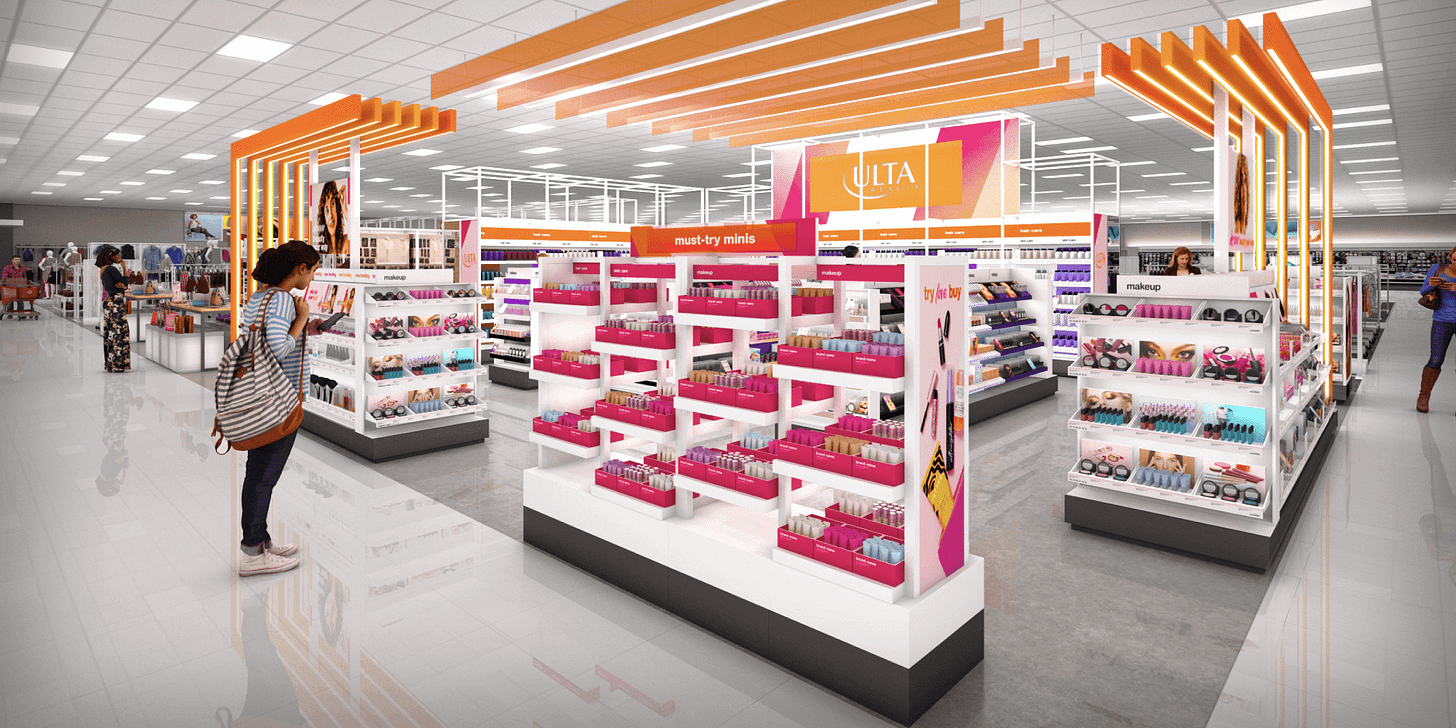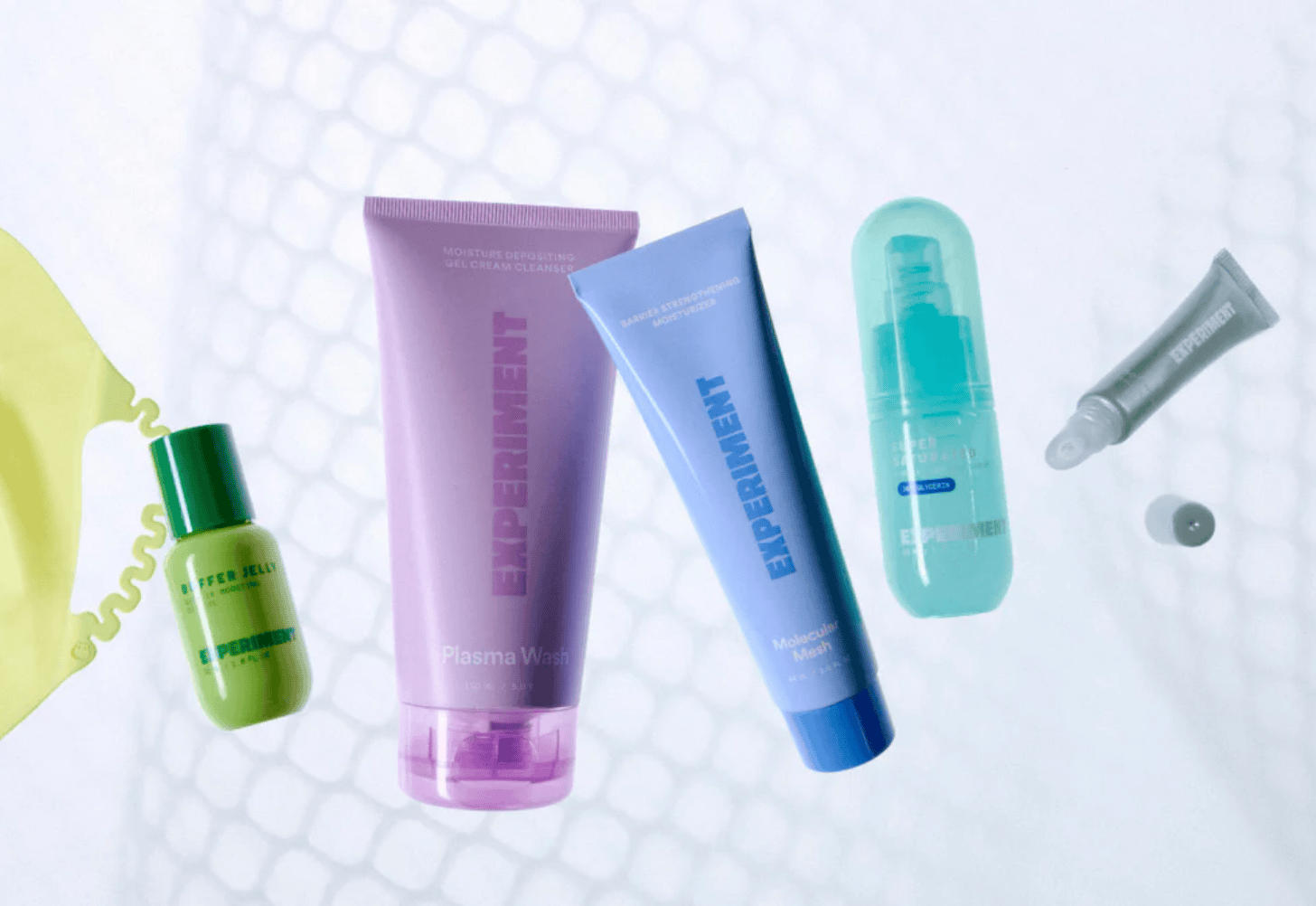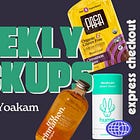Ulta & Target call it quits
CPG and Retail news from the week of 8/11/25
Hello hello!
We're officially gearing up to go to Newtopia Now this week! If you'll be in Denver for the show, shoot us a message. We'd love to meet up (and maybe feature you in some of our upcoming content 👀🎤)
Today's issue of Express Checkout is brought to you by our friends at minisocial. If you've been struggling to get quality UGC for your brand, you need to hear about this.
So here's the deal: minisocial connects you with micro-influencers who create authentic content for your brand (that you own the rights to).These creators share it with their own audiences first, so you get that organic reach, then you can repurpose the content literally everywhere—your ads, emails, social channels, you name it!
Brands like Bero, Copper Cow Coffee, immi ramen, and Ceremonia are already using it, and it's surprisingly affordable—starts at just $2.2k with no long-term contracts locking you in.
Oh, and because you're part of the Express Checkout fam, mention us and you'll get 15% OFF🙌
Now, let’s get into the news of the week →
News From the Week
Last week, we wrote about how Ulta is doubling down on the future of beauty by expanding its in-store Wellness Shops to tap into the $2 trillion wellness market. This week? Ulta is making headlines yet again—this time, for pulling the plug on its splashiest external play: its four-year shop-in-shop partnership with Target.
The mutual split tells us a lot about the future of Ulta, Target, and beauty retail more broadly. Let’s get into it →
First, a history lesson: When the partnership launched in 2021, the pitch was clear:
Ulta would bring prestige beauty to the masses, giving Target shoppers access to premium brands without making a separate trip.
Target would juice its fastest-growing category (beauty) with Ulta’s credibility.
Customers got a double-dip on loyalty rewards, plus the convenience of tossing Charlotte Tilbury into their cart along with paper towels.
The plan was to scale fast—Ulta x Target “shop-in-shops” expanded to ~600 stores, just falling short of its 800-store goal. By 2024, Ulta was pulling in ~$465 million annually from the partnership—roughly 4% of Ulta’s total revenue. On paper, it looked like a success.
So what went wrong? Turns out, a lot…
Cannibalization. Most Ulta-at-Target shops were located near standalone Ulta stores—siphoning sales from existing locations rather than bringing in new customers. And while it looked like Ulta was benefitting financially from this partnership, the retailer only received a royalty percentage of that lofty $465MM figure, translating to <1% of its revenue—a tiny lift for the effort.
Execution problems. The “mini-Ulta” experience wasn’t actually very… Ulta. Shoppers complained about awkward layouts, under-staffed beauty aisles, and a lack of expertise that made the spaces feel more like fenced-off sections than immersive beauty destinations.
Different goals, different shoppers. Ulta wants to protect its premium positioning; its new “Beauty Unleashed” strategy is about experiential stores, digital innovation, and elevating prestige. Meanwhile, Target is going the opposite way—rolling out 2,000+ new beauty products under $20 and leaning harder into value than Ulta’s premium bend.
What this means for both retailers:
Ulta: Pulling back signals confidence. It doesn’t need Target’s incremental sales for growth—Ulta’s loyalty program, return policy, and reputation keep customers coming back.
Rather than splitting margins, Ulta is investing in itself—expanding Wellness Shops and preparing to launch a Mirakl-powered online marketplace in 2025 that adds third-party wellness, beauty, and lifestyle brands.
The vision: Make Ulta the go-to hub for everything beauty and wellness.
Target: This hits… harder. Beauty was its only growth engine: category sales rose 5% to $13.2B last year—outperforming the rest of the business during a critical turnaround period.
The retailer’s had a tough couple of years: It’s seen 10 consecutive quarters of flat or declining sales, and a 4% drop in store traffic—both attributed to its DEI pullbacks. Now, it’s losing loss of 1,000 sq ft of valuable floor space per location.
What we predict: Without Ulta, Target must double down on what it does best: affordability, private-label wins, and accessible partnerships for value-driven shoppers.
TL;DR: For Ulta, the future is expansive: doubling down on wellness, prestige, and control. For Target, the future is defensive: filling a prestige beauty gap while fighting to reignite growth during bigger traffic challenges.
The real takeaway: Consumers aren’t just chasing access—they’re chasing experience. Ulta knows it can deliver that best under its own roof. Target now has to prove it can, too.
CPG & Consumer Goods
Riding the GLP-1 train. Danone's OIKOS brand is the latest to launch a product specifically designed for GLP-1 users.
The new OIKOS FUSION™ contains 23g of protein and a “specialized nutrient blend” to help prevent muscle loss during weight loss: a combo of whey protein, leucine (an essential amino acid which is already found in whey, but sure), and vitamin D.
Ketchup gets a spicy upgrade. Fly By Jing, the iconic Szechuan condiment brand, has teamed up with Taiwanese American content creator Frankie Gaw, AKA Little Fat Boy, to launch a chili crisp ketchup that infuses traditional flavors with a modern Szechuan twist.
Experiment’s long-awaited Sephora launch!!!! After three years of holding off for the perfect time, the science-driven, social-viral skincare brand is launching both online and in-stores at Sephora with six products priced between $16 and $32—filling a crucial gap in the retailer's clinical skincare lineup.
While much of the beauty world is moving towards “clean” beauty (think: beef tallow balm), Experiment is winning by swinging in the exact opposite direction. The brand, founded by two bad-ass female chemists, leans into science and uses parabens—synthetic preservatives that many modern beauty brands proudly exclude in their formulas. I love how they’ve been betting big on the pendulum swinging back in the opposite direction, despite a lot of noise suggesting otherwise. - J
This is by far one of my favorite brands, I think what Jenna said above is SPOT ON. I also own every single one of their products, Super Saturated is a magical thing though. I HIGHLY HIGHLY recommend. - N
Goat milk goes glam. Beekman 1802, the goat-milk powered skincare and body care brand, is branching out into hair with the launch of its Milk Therapy hair care line, debuting on QVC and HSN.
Is “lip wellness” the new skincare? Ashley Tisdale’s wellness brand, Being Frenshe, is launching a Nourishing Lip Mask and Restoring Lip Balm in the brand’s four signature scents, exclusively at Target.
I’ve always been fascinated by lifestyle brands expanding into different product lines with scent as the main common denominator/consistent brand identifier. IMO, the OG version of this was Bath & Body Works, which bottled up each of its scents into just about every possible product formula—from scented wall plug-ins to hand sanitizers. Instead of solely betting on winning formulas, brands like Frenshe are betting on consumers’ desire to add their “signature scent” to every part of their routine. - J
Made In heats up retail. The chef-inspired cookware brand is debuting an exclusive collection at Crate and Barrel, marking a critical milestone in their brick-and-mortar expansion after eight years as primarily direct-to-consumer since their 2017 founding
Unlike many DTC brands that rushed retail expansion, Made In deliberately built credibility with professional chefs first before expanding to serious home cooking enthusiasts.
Tilray turns up the buzz. Tilray is building on its portfolio of Delta-9 THC beverages with new 10mg drinks of its Fizzy Jane’s and Happy Flower brands, catering to consumer demand for variety in the growing THC beverage market.
eCommerce
Amazon gunning for Instacart’s lunch…literally. Amazon is extending Same-Day Delivery to include fresh groceries in over 1,000 cities, with expansion to 2,300 locations by year-end. Prime members get free delivery on orders over $25.
This is putting the pressure on companies like Instacart, FreshDirect, and DoorDash—forcing them to innovate or risk losing share.
My prediction? These companies will double down on hyper-local partnerships, strong retailer relationships and personalized service that just can’t be replicated at Amazon-level scale. - J
Funding news
It’s prime time for undies. Gildan is acquiring HanesBrands in a $2.2B equity deal to create a global apparel powerhouse. The combination unites iconic brands with efficient manufacturing, expecting $200M in annual synergies and 20% EPS growth over three years.
A beanless revolution. Singapore's Prefer raised $4.2 million to launch soluble, bean-free coffee and cocoa powders, offering food manufacturers a cost-effective way to cope with rising ingredient prices while maintaining flavor.
All-in on THC. Uncle Arnie’s, a cannabis beverage brand, just secured $7.5 million in funding, aiming to boost its team from 40 to 75 employees and dominate the THC drink market.
Aria Growth Partners aims high. After successfully exiting Hero Cosmetics for $630 million, the firm has closed a $152 million fund, targeting two to three deals annually in high-growth beauty brands. This move signals a renewed confidence in the booming beauty M&A landscape.
Weekly Pickups
Last week we chatted with marketing and brand strategist and serial entrepreneur Brooke Yoakam! →
Make sure you’re subscribed so you don’t miss our next edition!









